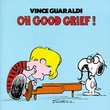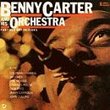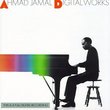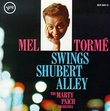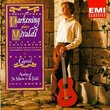| All Artists: Hakon Austbo Title: Piano Music Vol. 3 Members Wishing: 0 Total Copies: 0 Label: Naxos Release Date: 11/30/1999 Genre: Classical Styles: Chamber Music, Forms & Genres, Etudes, Historical Periods, Classical (c.1770-1830) Number of Discs: 1 SwapaCD Credits: 1 UPC: 636943409022 |
Search - Hakon Austbo :: Piano Music Vol. 3
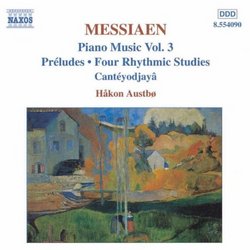 | Hakon Austbo Piano Music Vol. 3 Genre: Classical
|
Larger Image |
CD DetailsSimilarly Requested CDs
|
CD ReviewsPerformances of Modern Monoliths S. C Rice | 08/21/2001 (5 out of 5 stars) "Oliver Messiaen will most likely be remembered as one of the 20th century?s most craftsmanly and innovative composers. In his teachings at Darmstadt, he taught directly or influenced Pierre Boulez, Luigi Nono, Karlheinz Stockhausen, Franco Donatoni, Jean Barraque? and John Cage. Messiaen composed in a wide range of styles within the modern idiom. This piano music set demonstrates some of this variety. The 8 ?Preludes? are reminiscent of Debussy and have pseudo ? programmatic titles, just as the Debussy preludes. This pieces are excellent, many of them (in my opinion) thoroughly outdo the Debussy preludes in craft. The should be a more regular part of the piano oevure, especially with the frequency that Debussy is played. The ?Etude of Durations And Intensities? was presented at the summer classes at Darmstadt and was the spark that inspired Boulez to ?Structures I,? Stockhausen to ?KontraPunkt? and ?Kreuzspiel,? Cage to ?the Music of Changes,? unintentionally giving birth to both the American indeterminist school and the pieces of total serialism. A monolith piece in the development of music in the 1900?s; it should be heard. The last piece demonstrates the late technique of Messiaen, which was harsher than his early music, but no longer so experimental. The performance on this recording is clear and leaves the listener with a good idea of the pieces. A meritous listen; excellent piano music. A must for any musician, pianist or those interested in modern music. And at the naxos price!" A must for piano music lovers. Tom Furgas | Youngstown, OH United States | 10/11/2001 (5 out of 5 stars) "This splendid disc of piano works by Messiaen is an essential addition to any library of 20th century piano music. Hakon Austbo performs these works with authority and panache. The recording is superb, and as usual Naxos provides excellent liner notes, and all this for a teriffic bargain price, to boot! The previous volumes of Messiaen in this series are equally vital, and impressive. Bravo, Naxos!!!"
|

 Track Listings (13) - Disc #1
Track Listings (13) - Disc #1